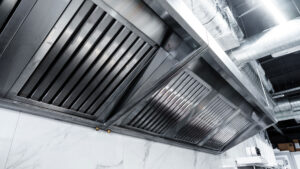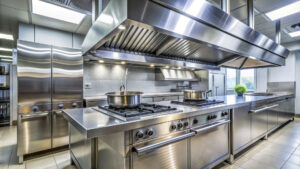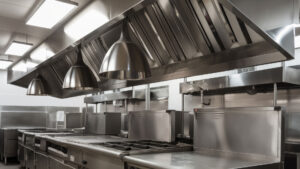Did you know that kitchen fires cause almost 30% of all home fires in the U.S.? Grease and flammable buildup in kitchen hoods are big contributors. This shows how critical it is to keep kitchen hoods clean. But, you might wonder: do you need to be certified to do this?
In some places, you must have a certification to clean kitchen hoods. Even where it’s not required, getting certified has many advantages. It shows you’re serious about your work and follow safety rules.
Key Takeaways
- Certification can be legally required for kitchen hood cleaning in some regions.
- Even in places without legal mandates, certification demonstrates professionalism and adherence to safety standards.
- Certified professionals are better at following safety and best practices.
- Properly cleaned kitchen hoods can greatly lower fire risks.
Benefits of Getting Certified for Kitchen Hood Cleaning
Getting certified for kitchen hood cleaning brings many benefits. It shows a business follows industry standards. This means they offer top-notch services that meet client needs and legal rules.
Credibility and Trust
Certification boosts a business’s credibility. Clients look for companies that show they know their stuff. In a crowded market, being certified makes a business stand out as trustworthy and dependable.
Insurance and Liability
Certification is key for managing insurance and liability. Insurance companies might give better rates or coverage to certified businesses. It also lowers the risk of legal trouble or fines by following the rules.
Meeting Client and Legal Requirements
More and more, clients and regulators want to see kitchen hood cleaning done right. Getting certified proves a business knows these rules. It meets client needs and keeps kitchens safe, following health and safety laws.
Do you have to be certified to clean kitchen hoods?
Whether you need a certification to clean kitchen hoods depends on where you are. It’s not a must everywhere, but some places require it. This is often because of fire safety and building codes.
Legal Certification Requirements
In places like Massachusetts and New York, getting certified is a must. These rules came after fires showed how important it is to clean hoods right. They see it as a way to keep people safe from fires.
People who clean kitchen hoods need to know the local rules. They must pass a test and keep learning to stay up-to-date.
Certification Programs
There are many programs to help you get certified. The International Kitchen Exhaust Cleaning Association (IKECA) is well-known. They teach the best ways to clean hoods and prevent fires.
Getting certified means you’ll learn a lot and feel more confident. You’ll know you’re doing a great job keeping places safe.
Conclusion
Understanding the hood cleaning certification process is key for kitchen maintenance pros. Legal needs for certification differ, but the perks are clear. Certified cleaners earn client trust, meet legal and insurance demands, and stand out in the market.
Certification means following top safety and efficiency standards. It shields businesses from risks and might cut insurance costs. It shows a dedication to a clean kitchen, vital for client health and happiness. Plus, it keeps a business in line with new rules and standards.
For those aiming to grow in kitchen cleaning, getting certified is a smart move. It’s more than just following the law. It boosts a business’s image, work quality, and future success.



